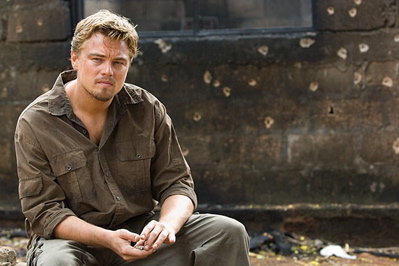“Relax, brew.”

Having come hot off the heels of The Queen, it was really strange to see Tony Blair turning the suffering of Africans into diamond money. Before that, I had made jokes about this movie being about Leonardo DiCaprio and Jennifer Connelly wresting diamonds from the hands of a not-so-much-evil-as-misunderstood David Bowie. What I saw was a movie that reinforced for me once again that, while the world is beautiful, humans are ugly. I reflected that I have not seen one movie that has made me want to go to Africa.
Blood Diamond is not going to make you want to go to Africa … at least the Sierra Leone of eight years ago. From the director of The Last Samurai, this is a different movie: Leonardo DiCaprio does nothing to save the people of Africa from themselves as Tom Cruise so nobly did for Japan a few years ago. It’s good, if not great, and very, very long.
Archer (Leonardo DiCaprio) is a diamond smuggler in Africa of 1999, a time when the G8 Summits were partly devoted to stamping out the “conflict diamond” industry. When he hears that Solomon Vandy (Djimon Hounsou), a man whose family was torn apart by the R.U.F., has found a pink diamond, he decides to “help” the man find his family and his fortune. Along the way he enlists the assistance of journalist Mandy Bowen (Jennifer Connelly) … and a lot of people get shot or otherwise brutally injured.
There was something that I didn’t quite feel about Blood Diamond, but I may have been tired. It hits many of the movie buttons that I go for rather squarely, yet it seems rather by the numbers in many places. It offers great scenes of tenderness between DiCaprio and Connelly that finish with contact rather than contact , a respectful distancing from the love-in that one might otherwise expect, and Hounsou seems convincingly dedicated to the idea of preserving his family above all else.
This is the sort of movie where a lot of people serve as shield characters, where only a core of three are important to the progression of the movie. Lots of incidentals are therefore allowed to die in a horrible fashion, and the process seemed to me as a rather less elegant game of elimination than that of Children of Men, which is perhaps the best “must reach goal at all costs” film I’ve seen.
I for one did not know about the child armies that are fairly prevalent around Africa (the epilogue text claims that Africa has 200,000 guerilla children), and this movie makes their existence clear in establishing concept scenes that are eerily similar to those employed in Teenage Mutant Ninja Turtles: that being a rebel is an experience not entirely dissimilar to drinking beer, smoking and playing poker. Parents be damned, we’ve got guns! Of course, that just goes to show how accurate Teenage Mutant Ninja Turtles was back in 1990.
I suppose that the problem with Blood Diamond is that it is not preachy enough. It basically suggests that people will take advantage of each other and that they are greedy, but it doesn’t say much more than that. My favourite part of the entire film is when Archer asks Mandy for assistance through her connections with the press junkets travelling through Sierra Leone. “This whole country is at war,” she says. “Why should I help one person?”
Then, after a suitably uncomfortable pause, she says “… I can’t believe I just said that.”
I couldn’t either; it was an excellent piece of compassion fatigue in a character that was herself a walking oxymoron: a journalist with a heart of gold and the cold, professional cynicism that seizes on precisely what “first world” readers want.
Yet somehow Blood Diamond acts at a remove from the situation that it represents, rather like the world itself does: this is happening “over there”, and doesn’t really affect us. Like many other films set in Africa, it’s a horrid travelogue of “I really don’t want to be there,” then the terribly guilt that comes from thinking “I’m not there. Hooray for me!”
These all seem like someone else’s problem. The developed world is represented in a cold, cynical light that is rather too accurate, which perhaps is what makes the ending a tad unrealistic. Solomon survives a gauntlet of deus ex machina situations to reach his goal of being … one person, out of a whole country at war, who was helped.
Blood Diamond offers no answers and can’t make up its mind as to whether the press is inherently good or evil. Let’s put it this way: Mandy Bowen sacrificed her brother to the goblin king when he was a baby. Sure, she went into the labyrinth and got him back, but does that make her a good person or did she simply not want to face the judgement of her parents?
It’s a movie of ambiguities, but also of absolute greed and evil. It doesn’t purport to have much in the way of a message, yet it ends with epilogue text that tells the audience not to buy conflict diamonds (well, it tells them to “make up their own mind”, but we all know what that means); it’s pretty to look at, but ugly to watch; it’s at once understated and overblown.
I liked Blood Diamond, certainly, but perhaps a little more in the way of direction, rather than simple wandering, would have pointed it on the road to glory. For someone without my confused leanings, it may play much better.

